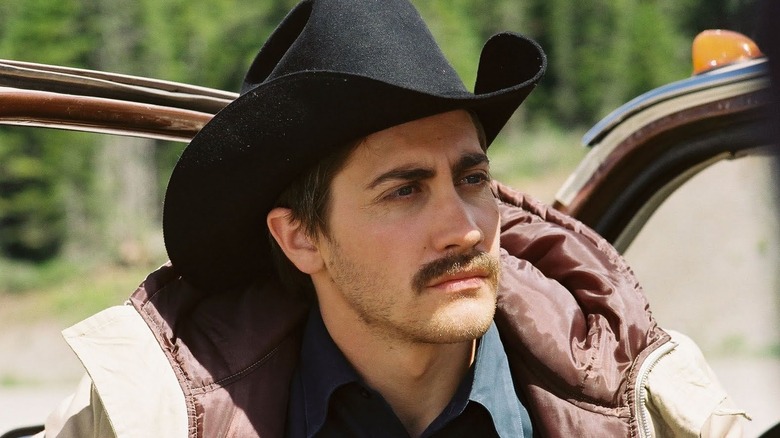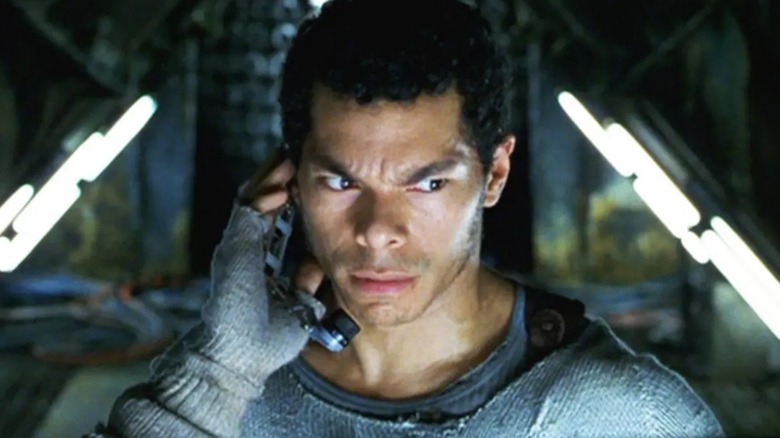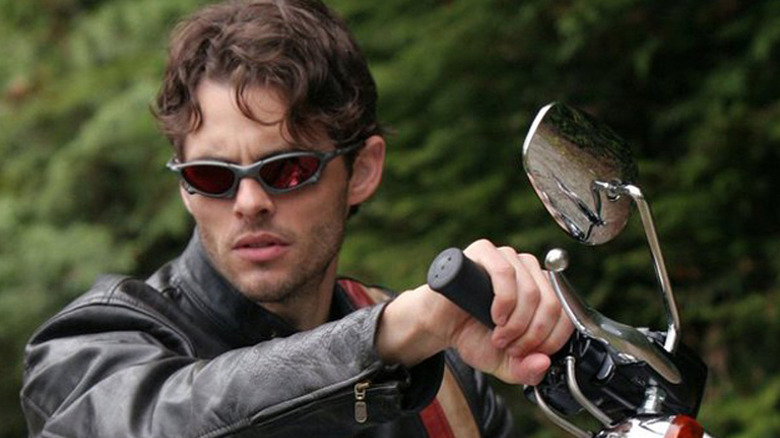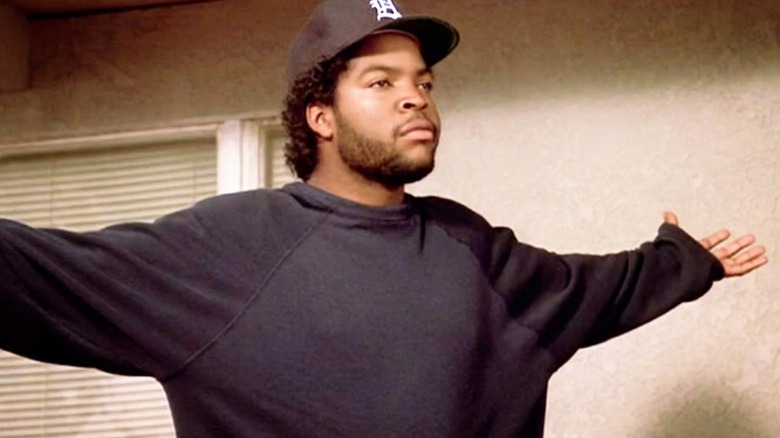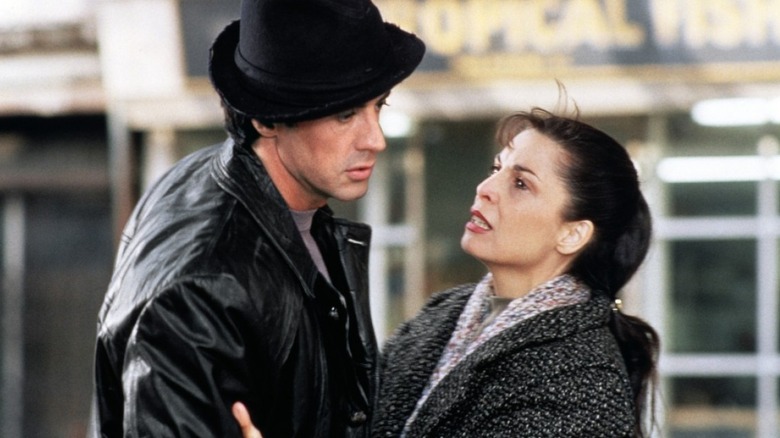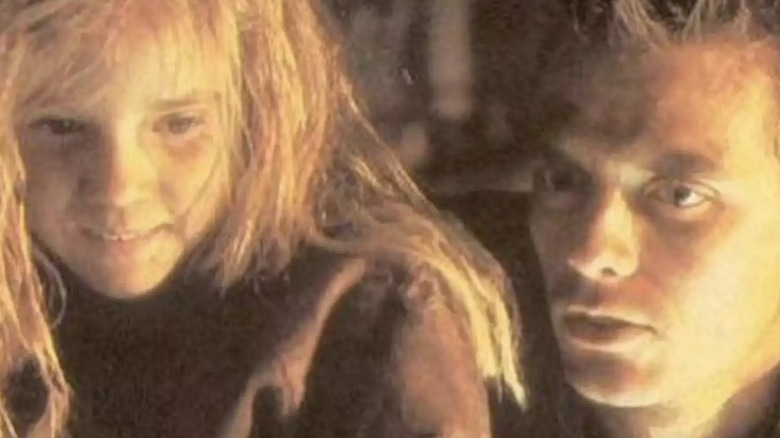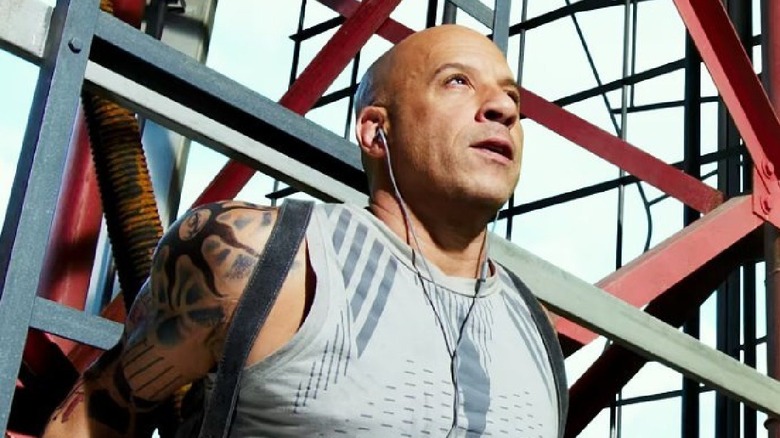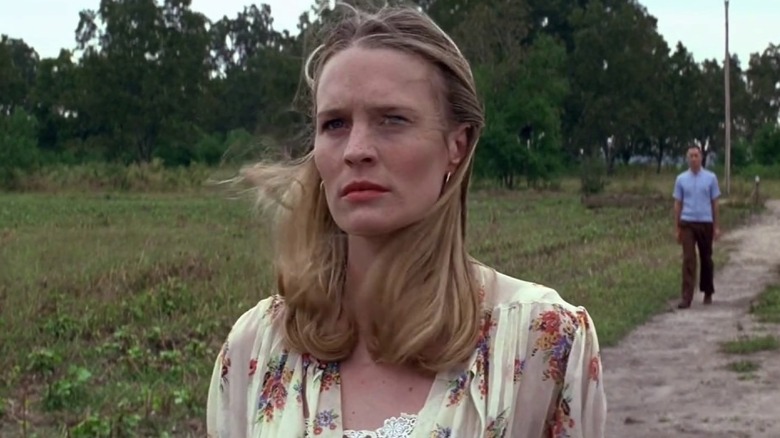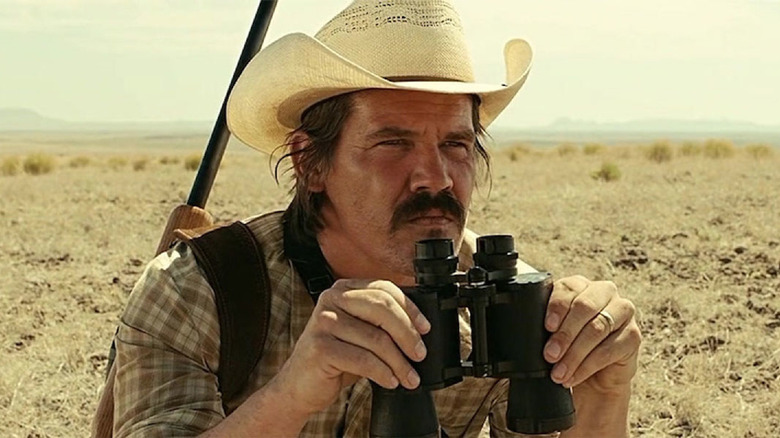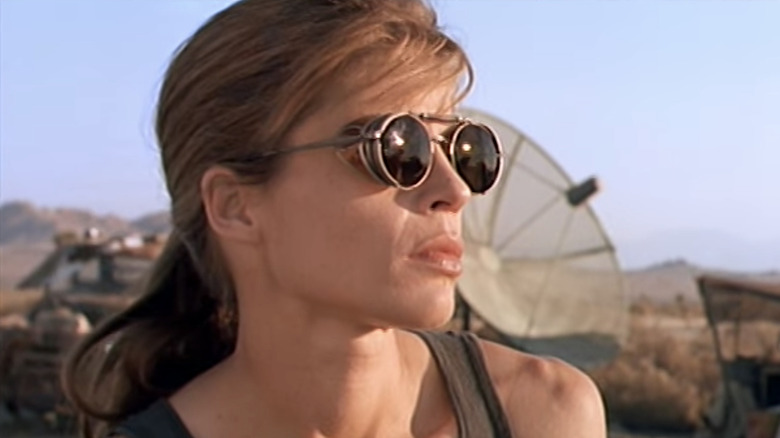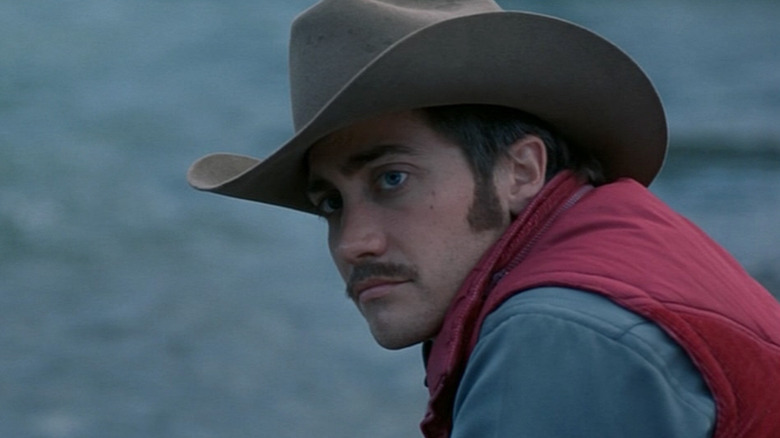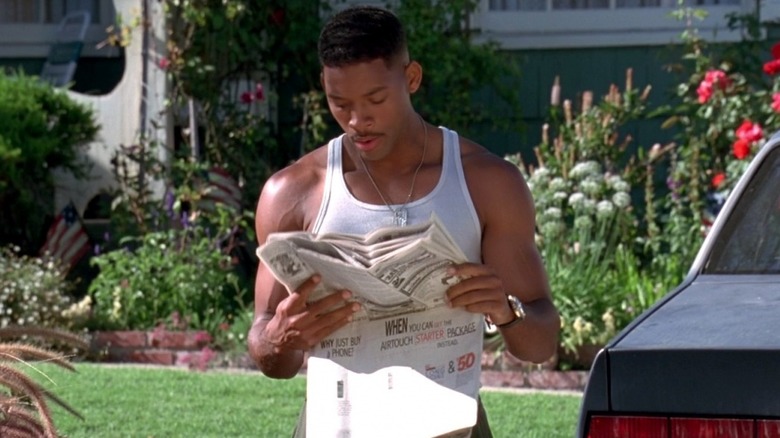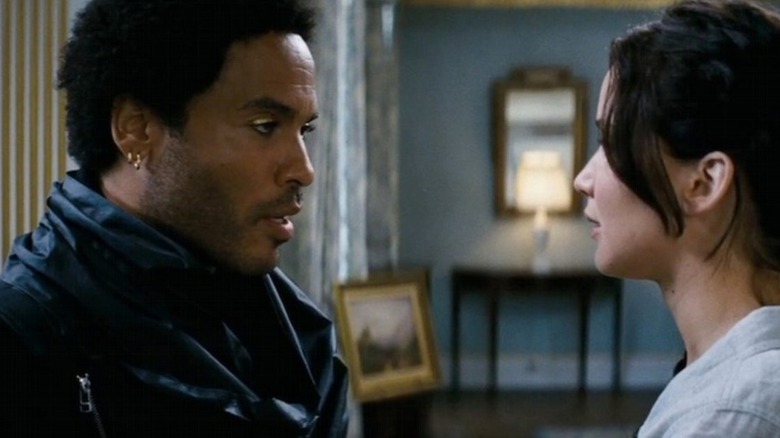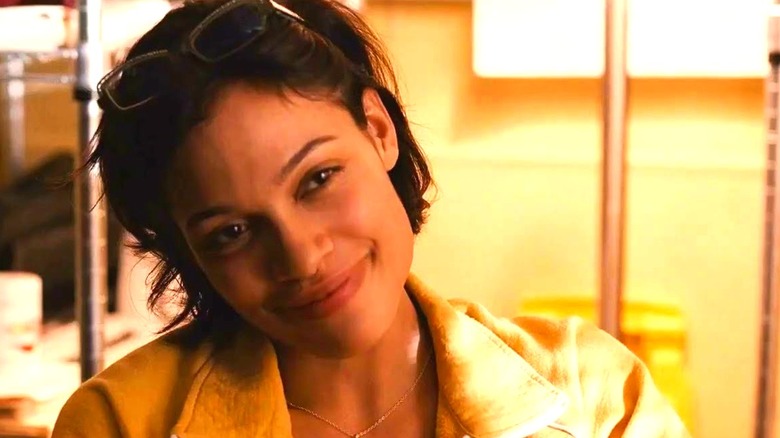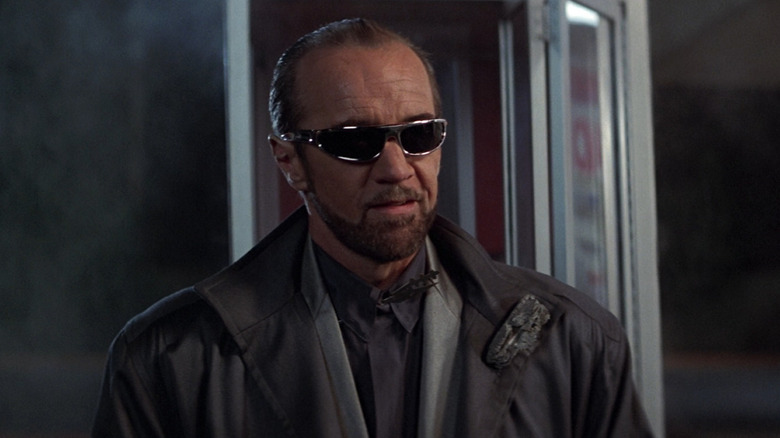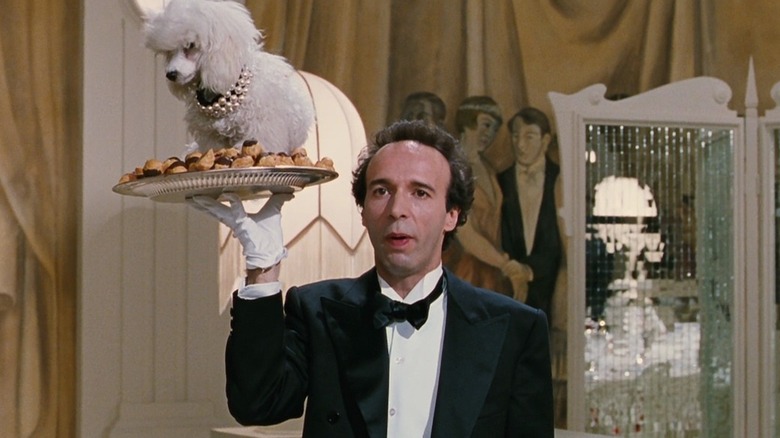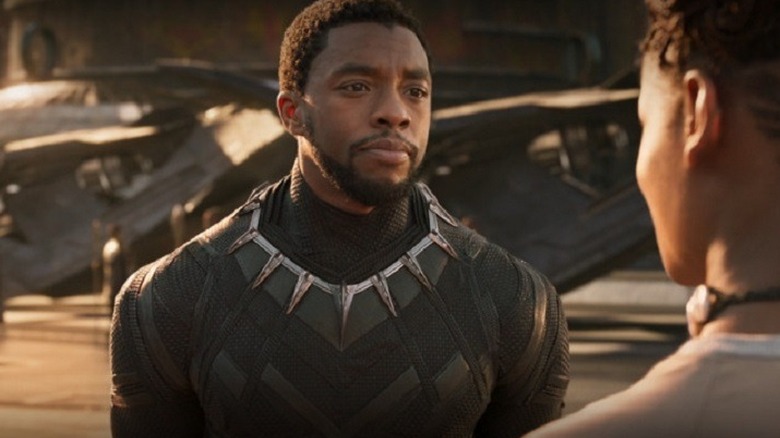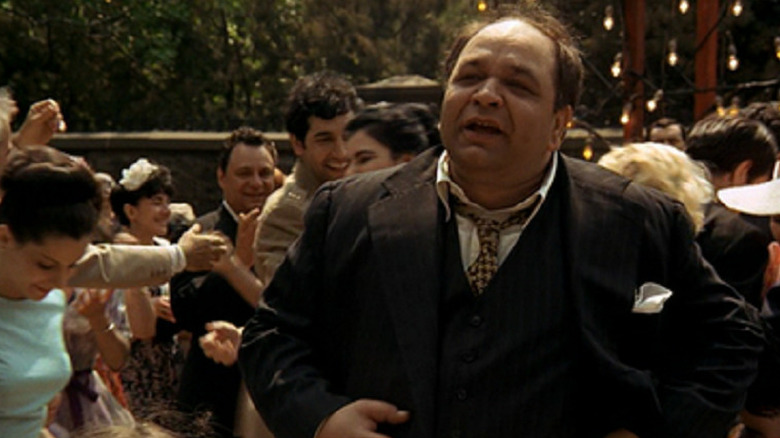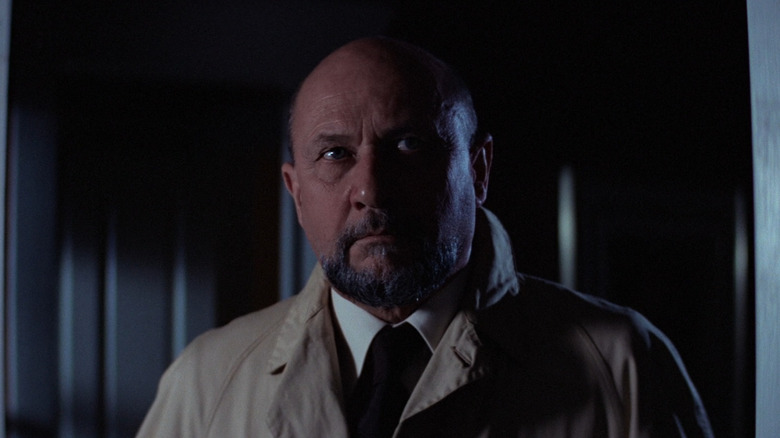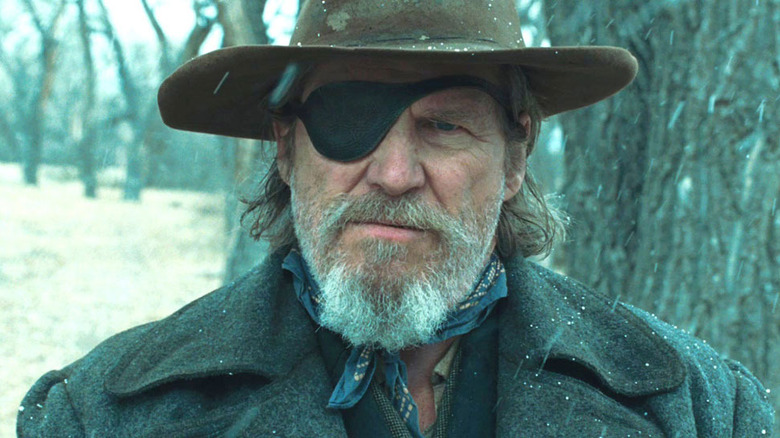Beloved Movie Characters Who Were Killed Offscreen
When a fan-favorite character from a popular movie or franchise is suddenly killed off, it can be jarring. But it's even more unsettling when it happens offscreen. The audience invests their time, attention, and even emotional involvement into a character — and suddenly that character vanishes from the film, with someone else in the story filling in the blanks by letting us know that the character has been erased from the world of the movie.
Sometimes we don't even see the body. Other times the demands of the plot dictate that the character must meet their demise while we're watching other events unfold. And sometimes, especially when a character makes it to the end of a movie but doesn't reappear in the sequel, other factors can weigh in as well.
Between other films to star in, personal matters to deal with, egos, and good, old-fashioned plot twists, not everybody gets a proper goodbye or that heartbreaking, memorable death scene. Let's take a look at some of the most beloved movie characters who were killed offscreen.
Tank (The Matrix Reloaded)
After the surprising success of "The Matrix," the cast of the odd little cyberpunk film became overnight sensations, and Neo (Keanu Reeves), Trinity (Carrie Anne Moss), and Morpheus (Laurence Fishburne) would go on to appear in the next two sequels, "The Matrix Reloaded" and "The Matrix Revolutions." Those who haven't "taken the red pill" since 1999, however, would be forgiven for forgetting another actor who lent his talents to the original film — namely, Marcus Chong, who portrayed Tank, the operator of their vehicle, the Nebuchadnezzar.
Although Tank survived the events of the first film, the Matrix pilot apparently died during an unseen mission prior to the sequel. The specifics of his death are never mentioned outright, but fans speculate that he likely succumbed to the Lightning Rifle wound he received during Cypher's failed one-man mutiny. To add insult to injury, Chong's character was replaced with an operator named Link, his apparent brother-in-law.
Rumor has it that Chong was set to appear in those first two "Matrix" sequels, but demanded a much higher salary than the one in his contract. After Chong was let go, he claimed to have crashed press junkets, stolen food from production offices, and crank-called the Wachowskis. He also accused the siblings of calling him a "terrorist," and straight-up sued them for going back on a promise to let him appear in the sequels. So it looks like he didn't take the firing lying down.
Cyclops (X-Men: The Last Stand)
Not every offscreen death comes as a result of problem actors. Sometimes, it's just a perfect storm of poor choices. And no offscreen death best epitomizes this frustrating phenomenon than that of Scott Summers, aka Cyclops (James Marsden), in "X-Men: The Last Stand."
After returning to the final resting place of his late fiancée, Jean Grey, Summers is astonished to find her alive, well, and rising from the water — as dead fiancées do. The two embrace and share a kiss. At which point Scott's skin begins rippling and his eyes pop open in fear.
Yeah, turns out that's not Jean Grey. Or, at least, it's not the one Scott knew and loved. To make a long story short, her "death" during the events of "X2" leads to the awakening of her alternate personality, the Phoenix, which assumes control of her body, killing Cyclops and generally being a nuisance for the rest of the film.
All of that, however, is not our issue with the notoriously mediocre movie. We're just peeved that the "X-Men" franchise killed off the mutants' de facto leader without the decency to give him a proper death scene. All we get is a shot of other mutant teammates arriving at Alkali Lake — where the kiss/kill went down — and finding Summers' shades near an unconscious Jean. You could say that the Phoenix got away ... Scott-free.
Doughboy (Boyz n the Hood)
The promotional poster for "Boyz n the Hood" isn't lying when it claims "it ain't no fairy tale." Taking place in South Central L.A. in the early '90s, John Singleton's directorial debut is a gritty portrait of poverty and gang violence. Its two main characters, Doughboy (Ice Cube) and Tre (Cuba Gooding Jr.) play polar opposites: the former epitomizes the reckless juvenile criminal type, while the latter strives to make something of himself by escaping the hood and going to college.
Fast-forward through a variety of confrontations, and a few almosts, to an altercation between Dough's Crips and a gang of Bloods, which all leads to the murder of Doughboy's half-brother, Ricky. After a maelstrom of bullets, murder, and revenge — with a little self-reflection thrown in for good measure — the film ends with a melancholic conversation between Doughboy and Tre as the two reflect on life in the hood. Dough admits that he thinks that the Bloods "punched the wrong clock on Rick," suggesting he should have died instead of his half-brother.
Audience expectation plays a huge role in whether or not a film successfully hits the poignant notes it aims for. So when Ice Cube's Doughboy fades out of sight at the end of "Boyz n the Hood," still alive, viewers are offered a few seconds of cautious optimism, until a heartbreaking caption appears, which reads: "Two weeks later he was murdered."
Adrian (Rocky Balboa)
How do you soften up a guy who gets paid actual money to pummel other men into mincemeat? Give him a quirky wife, that's how! Maybe we're being a little cynical — it's hard not to fall in love with mousy pet shop worker Adrian (Talia Shire) in the "Rocky" movies. Arguably the heart and soul of the boxing film franchise, Adrian was never afraid to speak up when her meathead of a hubby set himself up for a butt-whoopin' — like, say, challenging the six-and-a-half-foot-tall Ivan Drago to a match.
Still, she was loyal to Rocky until the very end. But thanks to an offscreen death between "Rocky V" and the franchise's sixth entry, "Rocky Balboa," we're not exactly sure when that end was. The sixth film picks up with Rocky living on his own, with Adrian apparently long dead. Oh well. At least she gets an Italian restaurant named after her.
With "Rocky Balboa" seeing the titular fighter as a tired, weathered shadow of his former self, it's Adrian's absence that gives his performance real dramatic weight. Sylvester Stallone claims he wanted to cut out Rocky's heart – and that's exactly what he did. Along with all of our hearts. Thanks for that, Sly.
Newt and Hicks (Alien 3)
After the events of "Aliens," hero survivor Ripley (Sigourney Weaver) finds herself with a potential new love interest and a surrogate daughter in the forms of Corporal Hicks (Michael Biehn) and the little girl Newt (Carrie Henn), respectively. Surviving the xenomorph queen's assault, the three — along with the badly damaged android Bishop (Lance Henriksen) — enter hypersleep in preparation to return to Earth.
Except, like in most "Alien" movies (and most movies, period), things don't go according to plan. James Cameron's "Aliens" may end on an optimistic note, but "Alien 3" is David Fincher territory. Haven't you seen "Seven"?
Let's rapid fire this one: due to an alien face-hugger problem on the ship, the four survivors are launched onto the surface of a prison planet; Newt drowns inside of her escape pod and Hicks — well, there's not much left of Hicks after his pod is impaled by a support beam.
Incredibly brutal and profoundly depressing, the brief glimpses of Newt's and Hicks' escape pods shocked audiences, and the instant collapse of Ripley's new pseudo-family was viewers' first indication that this wasn't the same kind of film as "Aliens." Sure, it wasn't a particularly great film (no thanks to about a billion production issues), but it returned the series to its horror roots with gusto.
Xander Cage (xXx: State of the Union)
The original "xXx" movie introduced us to extreme-sports-loving adrenaline junkie, and favorite secret agent of 20-year-olds with tribal tattoos, Xander Cage (Vin Diesel) — code name "xXx." As big a hit as it was, a sequel was inevitable. However, when Diesel turned down the sequel, the studio decided to move ahead without him.
The xXx-less follow-up, 2005's severely underwhelming "xXx: State of the Union," starred none other than Ice Cube. Even with "Die Another Day" director Lee Tamahori behind the camera, the film bombed, barely grossing $11 million beyond its budget. Worse, it killed Xander off: "State of the Union" briefly suggests he died in Bora Bora. No big deal apparently.
Unlike "Alien 3," this story does have a happy ending. After the box office flop that was "State of the Union," Diesel and action thriller veteran D.J. Caruso collaborated on a 2017 threequel, returning "xXx" to its roots in the aptly named "xXx: Return of Xander Cage" (with — you guessed it — zero explanation about how he survived). The flick garnered mixed reviews, but it became the highest-grossing entry in the series. Most importantly, though, it marked Diesel's homecoming as the monotone wise-ass in furs. For a brief shining moment, all was right in the world.
Jenny (Forrest Gump)
Maybe Corporal Dwayne Hicks helped squash an intergalactic threat only to die by accident, and, sure, super-duper Cyclops got Jean Grey'd into oblivion, but Jenny of "Forrest Gump" fame had it pretty darn awful too. Growing up in a household where everyday abuse was the norm, she'd go on to clumsily navigate adulthood like a blind rodent through a maze of mouse traps.
When she was lucky, she'd run into her future husband and lifelong BFF Forrest. When she was less lucky, she'd succumb to the evils of drug abuse and — well, who knows what else. In modern cinema's pantheon of sympathetic characters, Jenny Curran Gump ranks both among the most hated and most misunderstood.
No matter where you stand on her toxicity — or whether or not she was simply a product of the childhood abuse she suffered — there's no denying that the revelation of her death near the end of the film is one of its most heartbreaking moments. Of course, we'd known she was ill. She'd only married Forrest after he convinced her that he would care for her and little Forrest, their son. Altogether, these things work to make the scene where Forrest is talking to her grave even more tear-jerkery. Tear jerkerish? Just incredibly sad, OK?
Llewelyn Moss (No Country for Old Men)
The Coen Brothers are the kings of subverting tropes and toying with audience expectations. "No Country for Old Men," the neo-Western thriller based on Cormac McCarthy's novel of the same name, is perhaps their most critically acclaimed thriller among a filmography of genre-bending modern classics. It's also their most blatantly nihilistic, with a depiction of a bleak, bloody Texas in which the film's protagonist, Llewelyn Moss, is murdered offscreen.
Moss (Josh Brolin) goes out hunting and finds 2.4 million big ones along with a bunch of dead Mexican gangsters. He proceeds to take the money, as one would. Psychopathic hitman Anton Chigurh (Javier Bardem), tasked with reclaiming the cash, tracks our hero from motel to hotel until poor Llewelyn meets his maker. Cut to Tommy Lee Jones' character, Sheriff Bell, eating breakfast and talking about dreams.
There's also a complex plot involving Moss' mother-in-law, a bounty hunter played by Woody Harrelson, and a trail of bodies unlucky enough to find themselves on the business end of Chigurh's captive bolt pistol. But boiling it down to its base elements, "No Country for Old Men" is a bloody game of cat and mouse between Chigurh and Moss that ends with Moss eating a bag of bullets courtesy of the Mexican mob. However, instead of a firsthand account of the carnage, we get a brief glimpse of the aftermath only through Sheriff Bell's eyes — before he eats his first post-retirement breakfast.
Sarah Connor (Terminator 3: Rise of the Machines)
"The Terminator" was one of most exciting films to come out of the 1980s, instantly cementing the name Sarah Connor (Linda Hamilton) in the who's who of American pop culture. "Terminator 2: Judgment Day" upped the ante in the character development department, transforming Connor into a weapon-toting badass dedicated to preparing her son to become the human resistance leader — the rebel who would take up arms against the evil Skynet.
"T2," as the sequel was affectionately known, wound up earning a number of Academy Awards for its technical achievement, and found immediate critical and commercial success. So when "Terminator 3: Rise of the Machines" finally emerged from development hell in 2003, longtime fans expected their favorite waitress-turned-warrior to blast onto the screen guns a-blazin' ... but she never showed. And, worse, the movie reveals that she died of leukemia, offscreen, between the second and third films.
Of course, it was Linda Hamilton's choice to leave the franchise, claiming that her part in "T3" would have been insignificant compared to her character's arc from the first two films. "They offered me a part," she told MTV in 2009. "[Conner] died halfway through and there was no time to mourn her. It was kind of disposable, so I said no thank you."
Hamilton, along with Arnold Schwarzenegger and James Cameron — returning to the franchise for the first time since 1991 — reunited in 2019 for "Terminator: Dark Fate," but even the reappearance of Sarah Connor through the usual time-bending shenanigans couldn't stop it from being one of the biggest box office bombs of that year.
Jack Twist (Brokeback Mountain)
At a time when it's still pretty rare for a movie led by gay characters to be released by a major studio and have sizeable marketing dollars put behind it, the fact that "Brokeback Mountain" came out all the way back in 2005 makes it all the more remarkable. Buoyed by a pair of fearless performances from Jake Gyllenhaal as Jack Twist and the late Heath Ledger as Ennis Del Mar, the movie follows two cowboys who begin a passionate love affair that they keep secret from everyone around them for literally decades.
Naturally, having to live a lie for that long eats away at both of them and causes major turmoil within each of their respective lives, as they deceive friends, family, wives, and children in the process. Any chance they might have had to eventually be together for real is dashed when Ennis learns that Jack died, allegedly in an accident involving an exploding car tire. Ennis imagines that Jack was probably beaten to death by bigots, which is shown onscreen — but the movie doesn't explicitly state that this is what actually happened, only that it's Ennis's worst-case-scenario assumption. Technically, we never see Jack's actual death, but are only given his wife's somewhat far-fetched version of it.
Captain Steven Hiller (Independence Day: Resurgence)
"Independence Day" (1996) is inarguably one of the movies that made Will Smith a bona fide movie star. He might have shared the screen with an ensemble that featured such other heavies as Jeff Goldblum, Bill Pullman, and Vivica A. Fox, but it was Smith's movie all the way — which is why it was such a baffling decision to release a sequel, "Independence Day: Resurgence," and not have Smith return. He does briefly show up in a photograph hanging in a locker, but that's the extent of it.
During the film, we learn that his character, Captain Steven Hiller, was killed during a test run of one of the alien ships recovered during the previous invasion. His son is now an adult and is a captain himself, but he doesn't even get to be the lead of the movie — that distinction goes to a completely new character played by Liam Hemsworth. Maybe you forgot, or never even knew, that there was an "Independence Day" sequel in the first place, which is understandable as it was a box office bomb that came and went with little fanfare. Vivica A. Fox — who did return as Hiller's widow — told the A.V. Club, "I think the one true link that was missing to the success of 'Independence Day 2' was that Will Smith wasn't there."
Cinna (The Hunger Games: Mockingjay -- Part 1)
In both the "Hunger Games" books and films, Cinna was a definite fan-favorite character. Responsible for giving Katniss (Jennifer Lawrence) her various Capitol-approved makeovers, musician Lenny Kravitz proved that he could be a much more prolific actor if he wanted to be via his electric performance as Cinna in the movie series. Cinna is one of Katniss's only true supporters once she's away from her District 12 home and is being whisked between parades, television interviews, and having to return to the games — even though he knows he's literally risking his life to be her friend.
In fact, their bond is used against Katniss when she is forced to watch Cinna brutally beaten just before she ascends to her second games, as a way to put her at a mental and emotional disadvantage. Katniss knows that the Capitol probably isn't done punishing him for being kind to her, and sure enough, Effie Trinket (Elizabeth Banks) later breaks the news to Katniss that Cinna is dead. Even in a film series where offscreen deaths are the norm and happen often, while other characters' horrible deaths are fully shown, Cinna's demise is one of the most heartbreaking in the whole franchise.
Becky (Clerks III)
After he spends almost two entire films being endlessly knocked down by life, things seem to be looking up for Dante Hicks (Brian O'Halloran) at the end of "Clerks II." Chief among the reasons why he can finally be excited for his future is that he realizes his current fiancée, Emma (Jennifer Schwalbach), is wrong for him — and that his dream girl, Mooby's manager Becky (Rosario Dawson), has been right in front of him the whole time.
With both the announcement of Dawson's return in "Clerks III" and various trailers for the movie showing Becky and Dante together and smiling, it was easy to assume that they were still on the road to living happily ever after. Yet the audience is thrown a devastating curve ball when it's revealed that Becky has actually been killed by a drunk driver sometime between the events of "Clerks II" and "Clerks III" — and had been pregnant at the time, to boot. It turns out that Becky's presence in "Clerks III" is at times Dante dreaming about her, and other times her literally speaking to him from the afterlife, encouraging him to stop being sad about losing her and start learning to be happy without her.
Rufus (Bill and Ted Face the Music)
Comedian George Carlin spent much of his career almost constantly doing stand-up tours, leaving little time for anything else — especially acting. But he did make space in his busy schedule for a few film appearances over the years, the most famous of which is playing time-traveling guide Rufus in the first two "Bill and Ted" movies. The third installment in the series gestated for a long time before it finally went into production, but Carlin had already passed away by the time any serious talks of making the threequel were underway.
That said, it wasn't necessarily a foregone conclusion that we wouldn't see Rufus again in "Bill and Ted Face the Music." The last few years have seen several departed actors resurrected in CG form to reprise famous characters — and for a time, a CG George Carlin was indeed considered for "Face the Music." That was ultimately scrapped due to limited time and budget, among other reasons, though archival footage of Carlin (with a different actor's voice) was used so that Rufus could make one final cameo. However, it's just a hologram of Rufus at a museum, as the real Rufus is revealed to have died a few years prior to the point in the future that Bill and Ted are visiting during "Face the Music."
Guido Orefice (Life is Beautiful)
One of pop culture's most enduring images of actor and filmmaker Roberto Benigni is his best foreign language film Oscar win for "Life is Beautiful," which saw him enthusiastically climb over chairs — and audience members — on his way to the stage to claim his award and make his speech. That's arguably more well-known than the movie itself, though "Life is Beautiful" is a beautiful and heartbreaking tale of a father going to elaborate lengths to hide the atrocities of World War II from his son, which deserves a legacy just as strong as the award moment that it spawned.
Benigni directed, co-wrote, and starred in "Life is Beautiful," playing aforementioned father Guido Orefice. Guido doesn't want his son to know that they are actually in a concentration camp, so he convinces the son that the whole thing is one big game of pretend and that everyone else is in on the ruse and is playing their parts accordingly.
Guido is successful in that mission, with his son believing he has "won" the game even after the war has ended and he's celebrating the victory with his mother, who survives. But Guido is ultimately unable to save himself in the process, being led into an alley and shot to death offscreen by a German officer — which is especially tragic since the chain of events that brings an end to the war and the closure of the camps is already underway at that point.
T'Challa (Black Panther: Wakanda Forever)
The death of Chadwick Boseman of complications from colon cancer was as shocking as it was devastating, not only because of how young he was but because he hadn't even publicly revealed that he was diagnosed with the illness prior to his passing. Those who knew Boseman best said that, in addition to just being a private person, it was in his nature to worry about and care for others rather than be worried about or cared for himself — and that the last thing he would have wanted was to have people feel sorry for him.
With pre-production for a second solo "Black Panther" movie already underway at the time of Boseman's death, questions about how to proceed without him immediately came to the fore. Recasting him was ruled out almost immediately, as was having him come back in CG form. Instead, it was decided that his character, T'Challa, would also pass away in the Marvel Cinematic Universe, handled beautifully in "Black Panther: Wakanda Forever" in a touching tribute to both the actor and the character. Ultimately, T'Challa succumbs offscreen to an unknown illness, setting the stage for his sister Shuri (Letitia Wright) to become the MCU's new Black Panther.
Peter Clemenza (The Godfather Part II)
There are no shortages of iconic and oft-repeated quotes from "The Godfather" movie series, but among the best of the funnier ones is the immortal line, "Leave the gun, take the cannoli." It has become so ingrained in the world's subconscious that some call it a metaphor for leaving the past behind and embracing the future. It's originally spoken by Peter Clemenza (Richard Castellano) in the first "Godfather" movie, and after a mob hit he quite literally means to leave the firearm behind but bring the Italian pastry from the crime scene so as not to waste it.
Despite being a prominent character in the film, Peter didn't return — except via flashbacks to his younger self, played by actor Bruno Kirby — in "The Godfather Part II." Instead, he is said to have succumbed to a heart attack at some point between the timeline of the two films, though there is some skepticism from some of the other characters as to whether he died of natural causes or was murdered. Either way, the reason Peter went from major character to offscreen death was a result of creative differences between Richard Castellano and "Godfather" director Francis Ford Coppola, ultimately leading Castellano to quit the franchise — and soon after, acting altogether.
Dr. Samuel Loomis (Halloween)
Casual observers probably only remember the original "Halloween" as Michael Myers (Nick Castle/Tony Moran) vs. Laurie Strode (Jamie Lee Curtis). But true fans know that the real protagonist and lead character of the film was actually Dr. Samuel Loomis (Donald Pleasence), Myers' psychiatrist and primary pursuer as he goes on his violent rampage. In fact, he's the top-billed character and actor. Dr. Loomis' legacy among horror fans is a strong one, and he's even ranked as one of the most memorable doctors in movie history.
Considering Dr. Loomis lived on after the death of Donald Pleasance via different actors, he had the possibility of returning in the 2018 "Halloween" reboot that pretends all previous sequels never happened and only acknowledges the events of the original film. But given that the 2018 movie takes place 40 years later, and Dr. Loomis was already on the older end of middle age in the original, he would have been around 90 years old in the sequel, if not older. So it didn't make much sense to have him return, instead revealing that he had passed away during the four-decade time skip.
Rooster Cogburn (True Grit)
The Coen brothers' 2010 version of "True Grit" is a perfect example of how to do a remake right. It's also one of their only films that is a straight-up, no-frills genre picture, a surprisingly traditional Western rather than the siblings' usual surface-level twist on whatever primary genre the movie takes place within. In addition to an incredible performance by Jeff Bridges, it was the breakthrough film of future star Hailee Steinfeld, only 14 years old at the time and yet able to hold her own like a seasoned pro as one of the leads of a Coen brothers picture.
Over the course of the movie, Bridges's Rooster Cogburn forms an initially reluctant but ultimately sweet bond with Steinfeld's Mattie Ross. Which makes it an utterly heartbreaking moment when she accepts an invitation from him 25 years after their original adventure together to come see him in his Wild West show, only for her to learn after arriving — very matter of factly, no less — that he had only just passed away a mere three days prior. We didn't want to double dip with the Coens for this list, but both examples were just too compelling to have to choose one over the other.
